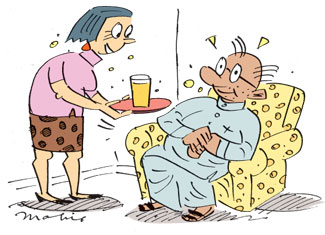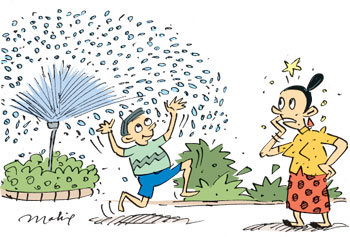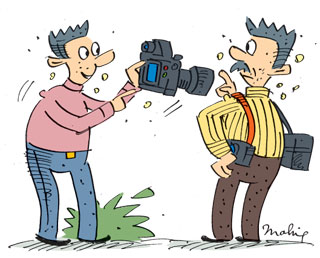|

by R. S. Karunaratne
Many uses of 'will'
in writing
'Will' is a modal verb. It is sometimes used for predictions. It also
expresses habitual and expected behaviour. 'Will+not' is contracted as
'won't'.
1. We use 'will' to make offers and promises.
I will give you a lift to the airport.
Will you have a cool drink?
|

Will you have a cool drink? |
Father will pick me up after the show.
I won't do it again.
He will help you to find the place.
2. We use 'will' to make requests or orders.
Will you buy me a pen?
Switch off the lights, will you?
I'll have strings for breakfast.
Will you bring me the bill, please?
Will you move a bit, please?
3. We use 'will' to make statements and predictions about future
events.
Met department says it will rain today.
Will it take long?
You'll love it!
ABC party will win the election once again.
He will lose his seat.
4. We use 'will' to talk about predictable behaviour.
Candidates will make false promises as usual.
If you meet him, he will talk to you about his good old days.
He will walk into office at any time.
5. We use 'will' to predict something that will be finished at a
certain time.
The project will be finished before Christmas.
By January next year I'll have completed 50 years!
According to the present situation an undergraduate will take seven
years to complete his degree course!
6. We use 'will be' to talk about something that is in progress in
the future.
The plane will be reaching Malaysia in four hours.
She will be 50 by next August.
Will you be riding your motorcycle to college next year too?
7. We use 'will' in the first conditional to say what will happen in
a given situation.
|

If you get wet, you will fall ill. |
Here, things are likely to happen.
If you get wet, you will fall ill.
If the door is locked, we'll break it down!
If you listen to him carefully, you will understand the subject.
She will pass the exam if she works hard.
8. We frequently combine 'will' with semi-modal verbs.
I'll have to call the police.
Will we need to bring our lunch?
Maya won't be able to attend the party.
9. We use 'will' commonly with verbs that express our hopes and
aspirations.
Do you think it will rain tomorrow?
I don't know whether he will help you.
10. Set phrases
A: Can we go to the theatre?
B: We'll see.
('B' will decide it later)
A: Xavier will beat Kumar.
B: That'll be the day.
('B' does not believe that it will happen)
Activity
Put 'will' or 'won't' in the correct place in the following
sentences. Check your answers with the key.
1. They say it rain tomorrow.
2. A fox attack a lion.
3. Who be at the prize-giving?
4. I have to talk to Martha about you.
5. If you don't hurry now, you late for the show.
6. I think you be able to work soon.
7. When you be having breakfast?
8. We start playing until you come here.
Key
1. They say it will rain tomorrow.
2. A fox won't attack a lion.
3. Who will be at the prize-giving?
4. I will have to talk to Martha about it.
5. If you don't hurry now, you'll be late for the show.
6. I think you will be able to work soon.
7. When will you be having breakfast?
8. We won't start playing until you come here.
Current English
usage
Being a living language English undergoes changes from time to time.
In this column the latest trends are highlighted.
1. Criterion and
criteria
Criterion is a singular word that means 'a standard by which
something or someone is judged.'
What criterion is used for selecting megastars in reality shows?
Criteria is the plural.
The contestants must satisfy all the criteria for entrance to the
reality show.
2. Critical
One meaning of critical is 'finding fault'.
The principal's report on the teacher's performance was very
critical.
Critical also means 'at a crisis'.
The patient is in a critical condition.
Today critical is used to mean 'making judgements or assessment of
artistic work'.
Most book reviewers give a critical evaluation of what they read.
3. Crucial
Crucial means 'decisive or critical'.
Your vote is crucial in electing a member for Parliament.
In current usage crucial means 'very important'.
It is crucial that you vote with the government.
4. Cuisine
Cuisine is spelt with a 'u' before the 'i'.
It means 'cooking' or 'a style of cooking'.
The cuisine at the new hotel is outstanding.
Pronounce the word as 'kwee-zeen'.
5. Curb and Kerb
Although the pronunciation is similar they mean two different things.
Curb means 'control' or 'restraint'. It is both a noun and a verb.
Officials have been ordered to curb their extravagance.
'Kerb' is 'the edge of a pavement.'
She stood on the kerb ready to cross the road.
6. Curriculum
Note the double 'r' and single 'l'.
It means a programme of educational courses'.
Teachers should be familiar with the curriculum.
As the word is derived from Latin, the plural form is 'curricula'.
However, in modern English 'curriculums' is becoming common.
7. Curriculum vitae
The abbreviation is CV It means 'a brief account of a person's
qualifications and career to date. You need to send a CV when you apply
for a job. 'Vitae' is pronounced 'vee-ti', the second syllable rhyming
with 'my'.
Starters :
Question tags
A statement can be turned into a question by adding a
question tag at the end of it.
This book is yours, isn't it?
Amara is beautiful, isn't she?
|

This camera is expensive, isnít it? |
This road is very broad, isn't it?
You are a kind teacher, aren't you?
They are very poor, aren't they?
There is no short form for 'am not' so 'aren't' is used to
form question tags.
I am very neat, aren't I?
I am tall, aren't I?
I am busy, aren't I?
I am fat, aren't I?
I am happy, aren't I?
We use negative question tags for positive statements.
This camera is expensive, isn't it?
These pens are cheap, aren't they?
This house is big, isn't it?
These houses are big, aren't they?
This dog is ferocious, isn't it?
In a statement with a main verb, the question tag
uses the negative form of the verb 'to do'.
Anula dances well, doesn't she?
He types a lot of letters, doesn't he?
They drive buses, don't they?
Mala sings a song, doesn't she?
Children sing songs, don't they?
We use contractions in question tags.
The fisherman catches fish, doesn't he?
Note: We do not say, 'does not he?'
We use pronouns, not nouns, in question tags.
My sisters play netball, don't they?
Note: We use 'They' for sisters.
Activity
Fill in the blanks with the correct question tags.
Check your answers with the key.
1. She is ready to go, ..........?
2. Students need stationery, ...........?
3. The room is locked, ......................?
4. Some motorists drive carelessly, ...........?
5. The train is slowing down, ..........?
6. The dog is making funny noises, ..............?
7. The dog barks at strangers, ..............?
8. I am a good cook, ...........?
9. You are very noisy, ......?
10. You and I enjoy funny stories, ..............?
11.The children are cute,..................?
12.She is a kind person, ........?
Key
1. She is ready to go, isn't she?
2. Students need stationery, don't they ?
3. The room is locked, isn't it?
4. Some motorists drive carelessly, don't they?
5. The train is slowing down, isn't it?
6. The dog is making funny noises, isn't it?
7. The dog barks at strangers, doesn't it?
8. I am a good cook, aren't I?
9. You are very noisy, aren't you?
10. You and I enjoy funny stories, don't we?
11.The children are cute, are't they?
12.She is a kind person, isn't she?
|

